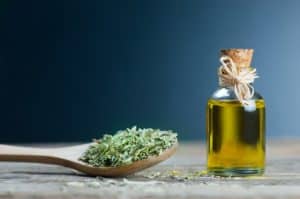By Dr. Teri Goetz, DACM, LAc
Common kitchen herbs are powerful antiviral factories. Use them regularly—the fresher the better, but they’re also good as teas, tinctures and/ or in cooking (especially when added toward the end).
Oregano, thyme and sage are potent anti-viral herbs you likely have in your home kitchen. Make a simple tea from two or three of these herbs combined and drink one or two glasses per day. You can also make a stronger brew by putting 4 cups of water into a pot, adding a couple teaspoons of the herbs, an onion cut into quarters, some fresh smashed garlic and scallions (with their roots attached), and a nob of fresh ginger (ginger is believed to help the lymphatic system, build immunity and is a “harmonizer” and included in many recipes in TCM). Bring to a boil, then simmer for 10 minutes with a lid on (to keep the volatile oils intact). Strain and drink. You can also keep adding water, keeping it on a simmer throughout the day, drinking a cup every time you think of it. Think preventively, 2-4 times/day. If you’re sick, you can drink it every hour.
Oregano oil contains carvacrol and thymol, which are anti-viral, anti-bacterial, and anti-fungal. It’s an exceptional antiseptic. You can buy oregano capsules, as well, but do know that concentrated amount of oregano can be tough on your stomach, so avoid this if you have a history of stomach issues. Although, if you do get sick, it might be worth a little stomach upset to get over the cold faster. For sensitive individuals, use pure essential oil one drop in water or 1/2 cup of cold pressed flax oil or EVOO. If that is too strong, breaking it down into smaller dosages and drinking several times throughout the day is a good alternative.
One of the strongest antioxidants known is thyme. In herb or oil form, it has been used for centuries as an antiviral  and antibacterial (on house surfaces, on the skin, and taken internally). Adding thyme to your food can be very beneficial. It also eases anxiety, increases circulation, treats tooth decay and mouth germs, and is even a great component in bug spray.
and antibacterial (on house surfaces, on the skin, and taken internally). Adding thyme to your food can be very beneficial. It also eases anxiety, increases circulation, treats tooth decay and mouth germs, and is even a great component in bug spray.
You can also make a very strong tea from these herbs and put it in a spray bottle (with or without alcohol) to wipe down kitchen counters, sinks, doorknobs, and light switches.
Add some white radish (daikon), black or red radish to the mix. (You can eat these raw in salads, grated or sliced). Daikon is a Chinese medicine superfood, as it helps with digestion, helps break down fats, boosts the immune and respiratory systems, is anti-inflammatory, helps regulate blood pressure and hormones, and even strengthens bones as it is very high in calcium. You can also stir fry these babies with a little scallion, ginger and/or garlic and enjoy warm. Or try juicing radishes or just munch on a couple once or twice per day.
Garlic is one of my favorite anti-microbials! It contains “allicin,” an antiviral compound found in either garlic extract or crushed garlic (it must be crushed in order to activate it). Once chopped, it’s recommended that you let it sit for 5-10 minutes before consuming. You can cook it (although that may decrease its potency) or eat it fresh. One recommended method is to hold a smashed piece in your mouth for 15 minutes between your teeth and gums or cheek, then consume it. Eat a few sprigs of parsley to both help neutralize its odor and to help the burning sensation in the digestive tract. Mixing it with food (like slicing it into fruit or salad) helps to make it less hot. As an alternative, you can buy garlic capsules, as well. Note that if you are a very hot person (canker sores, red face and eyes, feeling overly hot), this may not be the remedy for you or use a smaller quantity.
Black pepper is ideal for general prevention. Use freshly cracked, as commercially sold pepper is roasted and more irritating. Pepper helps you sweat, which is good at the beginnings of a cold and helps protect against viral infections. Add toward the end of cooking or freshly grind onto food.
Citrus seed extract (grapefruit seed) is a good remedy and preventive treatment. It’s quite bitter, but also non-toxic, and so good for long-term use. Excellent to use while traveling, it is especially good with a “damp” constitution or damp bodily conditions (so it’s also good for candida). A few drops added to laundry helps to sterilize clothes, or you can add a few drops to vinegar and water as a counter wash.
Turmeric activates T cells and is highly anti inflammatory.
Mustard greens help clear chest congestion and reduce clear white mucus. You can also use in a tea.
Dandelion has antiviral and antifungal properties.
Green tea contains catechins, which can help inhibit virus replication.
Other herbs to consider eating and or making into a tea which have anti-viral and anti-inflammatory properties:
Sweet basil
Holy basil
Fennel
Peppermint
Rosemary
Viola
As always, please check herb-drug interactions. Plant medicine is very safe when used properly but can interact with  medicines you may be taking. Please check with your healthcare provider. If you are pregnant or nursing, consult your doctor. It is always best to consult with a knowledgeable health care provider for your specific needs.
medicines you may be taking. Please check with your healthcare provider. If you are pregnant or nursing, consult your doctor. It is always best to consult with a knowledgeable health care provider for your specific needs.
for more information visit terigoetz.com
